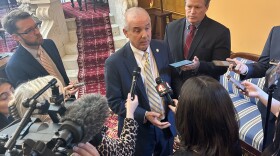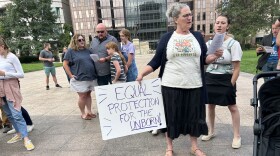The Ohio Supreme Court is asking the parties involved in a lawsuit over Ohio’s law banning abortion after six weeks to submit arguments on what effect, if any, the abortion and reproductive rights amendment approved in Issue 1 has on that case. And it’s looking like the attorney for the state is going to have to make an argument he said he personally disagrees with.
Attorney General Dave Yost hasn’t filed those arguments yet, but said this to a group at Ohio Republican Party headquarters just before early voting started.
"Somebody actually said this – "I’m not really worried about Issue 1 because we’ll still have the ‘heartbeat bill’." No, we won’t," he told the GOP volunteers.
That goes along with his office’s legal analysis of Issue 1. That analysis said approval of Issue 1 would invalidate the six-week ban. That ban does not include any exceptions for rape or incest.
The analysis, ordered by Yost and written by attorneys and staff, detailed some of the laws that would be affected if Issue 1 is approved. Of the so-called "Heartbeat Act", the analysis said: “Some of Ohio’s laws may be defensible, but the Heartbeat Act would not exist if Issue 1 passes. Ohio would no longer have the ability to limit abortions at any time before a fetus is viable. Viability is generally thought to be around 21 or 22 weeks. Passage of Issue 1 would invalidate the Heartbeat Act, which restricts abortions (with health and other exceptions) after a fetal heartbeat is detected, which is usually at about six weeks. No other pre-viability limit would be allowed.”
Yost’s office said in an email: “We have been ordered to brief these questions, and will do so. We will speak through the brief.” The office also pointed to language in the legal analysis on Issue 1 regarding the six-week ban.
Yost also posted on social media this week: “Having thoroughly scoured the Constitution, I find no exception for matters in which the outcome of an election is contrary to the preferences of those in power.”
The amendment approved by 57% of voters guarantees abortion access, but says it can be prohibited after fetal viability.
Ohio Right to Life President Mike Gonidakis also said Issue 1 will mean the six-week ban is unconstitutional: “I believe, yes, it will, because the Constitution trumps state law.”
And in that interview for "The State of Ohio", Gonidakis also said he believes the current ban on abortion after viability, the so-called "Pain Capable" Act which he helped draft in 2016, will stand—and he said he thinks that's what voters want.
"I think we can find some common ground, and I believe it would be our 20-week ban," Gonidakis said. "Our mission is to protect life from conception to natural death. But if that's what we can live with presently, and we'll have to continue to change hearts and minds."
Nearly all abortions happen before 20 weeks. The 2022 Ohio Abortion Report shows 89% of abortions were conducted before the 13th week of pregnancy. Only 0.6% of abortions were performed between 21 and 24 weeks, and there were none after that point.
"I firmly believe if we would have stopped at the 'Pain Capable' law, we would we would have been successful last week," Gonidakis said.






